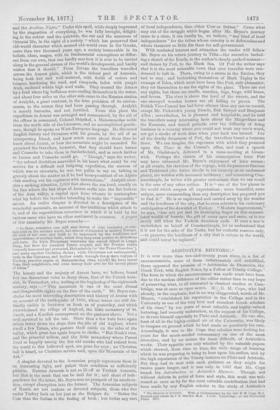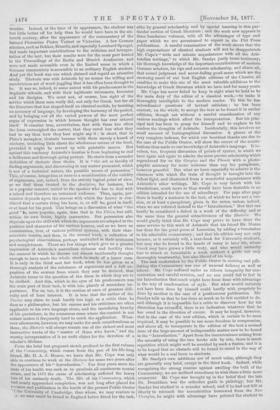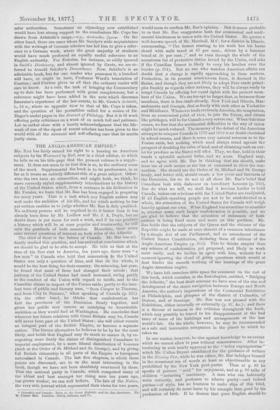ARISTOTLE'S RHETORIC.*
IT is now more than two-and-twenty years since, in a list of announcements, some of them unfortunately still unfulfilled, there appeared the promise of " Aristoteles de Rhetorica, the Greek Text, with English Notes, by a Fellow of Trinity College." The form in which the announcement was made must have been duo to the modest diffidence of the editor rather than to any hope of preserving what, to all interested in classical studies at Cam- bridge, was at once an open secret. M. E. M. Cope, who bad already, in the emphatic, but in no way exaggerated, words of Mr. Munro, "established his reputation in the College and in the University as one of the very best and soundest Greek scholars of his time," by ten years of most valuable and highly-valued lecturing, had recently undertaken, at the request of his College, to devote himself especially to Plato and Aristotle. No one else, least of all in the highly-critical air of the University, was likely to trespass on ground which he had made so peculiarly his own. Accordingly, it was to Mr. Cope that scholars were looking for years for the much-needed commentary on one of the most attractive, and by no means the least difficult, of Aristotle's works. Their appetite was only whetted by the valuable papers which showed, from time to time, the wide range of learning which he was preparing to bring to bear upon his author, and by the high reputation of the Trinity lectures on Plato and Aristotle. But they had to wait with such patience as they might for twelve years longer, and it was only in 1867 that Mr. Cope issued his Introduction to Aristotle's Rhetoric. Though not without defects in point of form and style, this work was wel- comed at once as by far the most valuable contribution that had been made by any English scholar to the study of Aristotle's * The Rhetoric of Aristotle. With a Commentary by the late E. M. Cope, M.A. Revised and edited by J ii. Sandys, M.A. 8 vols. Cambridge at the University Press. 1877,
treatise. Indeed, at the time of its appearance, the student was but little better off for help than he would have been in the six- teenth century, after the appearance of the commentary of the learned Florentine Pietro Vettori or Victorius. A few German scholars, such as Bekker, Brandis, and especially Leonhard Spengel, had made important contributions to the criticism and interpre- tation of the text, but their results were for the most part buried in the Proceedings of the Berlin and Munich Academies, and were not made accessible even in the limited sense in which a German commentary is accessible to an ordinary English student. And yet the book was one which claimed and repaid an attentive study. Rhetoric was with Aristotle by no means the trifling and meretricious art of word-juggling that it has often been thought to be. It was so, indeed, to some extent with his predecessors in the Sophistic schools, and with their legitimate successors, Isocrates and his disciples. We must not, of course, lose sight of the
service which these men really did, not only for Greek, but for all the literature that has shaped itself on classical models, by insisting on accuracy of language, by developing the harmony of the period, and by bringing out all the varied powers of the most perfect organ of expression in which human thought has ever uttered itself. It remains true, nevertheless, that with them too often the form outweighed the matter, that they cared less what they had to say than how they best might say it ; in short, that in Plato's metaphor, rhetoric became with them merely a knack of cookery, troubling little about the wholesome nature of the food, provided it might be served up with palatable sauces. But against this tendency Aristotle's treatise is from beginning to end a deliberate and thorough-going protest. He starts from a sounder definition of rhetoric than theirs. It is "the art or faculty of finding arguments, and discovering in any matter presented, which is not of a technical nature, the possible means of persuasion." This, of course, brings him at once to a consideration of the validity of arguments, not, indeed, from the strictly logical point of view, as we find them treated in the iina/gties, for instance, but in a popular manner, suited to the speaker who has to deal with a mixed and therefore an untrained audience. Then, again, per- suasion depends upon the success with which the hearer is con- vinced that a certain thing has been, is, or will be, good in itself, or at least for his good. This brings on a discussion of what "the good "Is, more popular, again, than that in the Ethics, but still, within its own limits, highly instructive. But persuasion also depends upon the skill with which the arguments are adapted to the position and character of the various hearers, and so we have an examination, first, of various political systems, with their char- acteristic results, and then, in the second book, a collection of psychological observations, perhaps unrivalled in their acuteness and completeness. There are few things which give us a greater impression of Aristotle's marvellous richness and fertility than the manner in which he throws out almost incidentally thought enough to have made the whole stock-in-trade of a lesser man. It is only in the third and last book, when he has given us a thorough analysis of the substance of arguments and a full ex- position of the sources from which they may be derived, that Aristotle turns to the question of the dress in which they are to be clothed. And this, which in the eyes of his predecessors was the main part of their task, is with him plainly of secondary im- portance. For us, too, it is the section at once of greatest diffi- culty and of least interest. It is true that the author of the Poetics may claim to rank hardly less high as a critic than he does as a philosopher, but his canons and his criticisms are often applicable to his own language alone, and the tantalising brevity of his quotations, in the numerous cases where the context is not extant makes it frequently hard to catch the application. What- ever allowances, however, we may make for such considerations as these, the Rhetoric will always remain one of the richest and most instructive works of the "master of those who know," and the worthy interpretation of it no unfit object for the devotion of a scholar's lifetime.
From the brief but pregnant sketch prefixed to the first volume of the C'ommentary, which comes from the pen of his life-long friend, Mr. H. A. J. Munro, we learn that Mr. Cope was only able to continue to work at the Rhetoric for some two years after the appearance of his "Introduction." For four years more the state of his health was such as to preclude all continuous mental strain, and in 1873 the cause of scholarship suffered the heavy loss of his untimely death. The MS. of his Commentary, which had nearly approached completion, was not long after placed for revision and publication in the hands of the present Public Orator £ the University of Cambridge, than whom, we may venture to
.y, no man could be found in England better fitted for the task, alike by general scholarship and by special learning in this par- tioular section of Greek literature ; and the work now appears in three handsome volumes, with all the advantages of type and paper which we arc accustomed to expect in the Pitt Press publications. A careful examination of the work shows that the high expectations of classical students will not be disappointed. Mr. Cope's "wide and minute acquaintance with all the Aris- totelian writings," to which Mr. Sandys justly bears testimony, his thorough knowledge of the important contributions of modern German scholars, his ripe and accurate scholarship, and above all, that sound judgment and never-failing good-sense which are the crowning merit of our best English editions of the Classics, all combine to make this one of the most valuable additions to the knowledge of Greek literature which we have had for many years.
Mr. Cope has never failed to keep in sight what he held to be the main duty of the editor. of a classical work,—to make it thoroughly intelligible to the modern reader. To this he has subordinated questions of textual criticism ; he has been content, on the whole, to accept the text as he found it in earlier editions, though not without a careful consideration of any various readings which affect the interpretation. But his prin- cipal task has been to grasp for himself and to explain to his readers the thoughts of Aristotle. Incidentally, this involves no small amount of lexicographical discussion. A glance at the very complete indexes, for which our heartiest thanks are due to the care of the Public Orator, will show the extent of the contri- butions thus made to our knowledge of Aristotle's language. It in- volves, too, frequent discussion of points of syntax, in which we have again and again to admire the same precise scholarship which reproduced for us the Gorgias and the Phaedo with a photo- graphic accuracy far more welcome than any lax paraphrase, however graceful. But what we have especially to admire is the clearness with which time train of thought is brought into the fullest light, and illustrated from a wonderful acquaintance with Aristotle's other writings. Mr. Cope is very lavish with his translations, much more so than would have been desirable in an edition intended for the use of schoolboys. For page after page there is hardly a sentence in the text, of which we have not a ver- sion, or at least a paraphrase, given in the notes, unless, indeed, when we are referred instead to the "Introduction." But this can hardly be considered a defect in a work of the difficulty and at the same time the general attractiveness of the Rhetoric. We would gladly think that Mr. Cope may prove to have done the same service to this work of Aristotle that his friend Mr. Munro has done for the great poem of Lucretius, by adding a translation to his admirable commentary ; and that his edition may not only become, as it certainly will, a text-book for University students, but may also be found in the hands of many in later life, whose Greek may have grown a little rusty, and who would naturally fear to attack so formidable a work without a guide not only thoroughly trustworthy, but also liberal of his help.
The task undertaken by the Public Orator in revising and Fib- lishing this Commentary was one of unusual delicacy as well as labour. Mr. Cope suffered under an inborn incapacity for con- centration and careful revision, and no one could fail to feel in his Introduction that much might have been done with advantage in the way of condensation of style. But what would certainly not have been done by himself could hardly with propriety be done by another in the case of a posthumous publication. Mr. Sandys tells us that he has done as much as he felt entitled to do, and although it is impossible for a critic to discover how far his discretion has extended, there is no indication whatever that he has erred in the direction of excess. It may be hoped, however, that in the case of the new edition, which is certain to be soon required, it may be possible to use more freedom in compression, and above all, to incorporate in the edition of the text a revised issue of the large amount of indispensable matter now to be found in the "Introduction." Apart from the inconvenience arising from the necessity of using the two books side by side, there is much repetition which might well be avoided by such a fusion, and it is to be hoped that no obstacle will be found to stand in the way of what would be a real boon to students.
Mr. Sandys's own additions are of much value, although they are generally very brief, except in the third book. Indeed, while recognising the strong reasons against swelling the bulk of the Commentary, we are inclined sometimes to wish them a little more - numerous. Mr. Cope was brought up in the belief that the late Dr. Donaldson was the orthodox guide in philology, but Mr. Sandys has studied in a sounder school, and if he had not felt at liberty to retrench the eccentricities borrowed from the New Cratylus, he might with advantage have pointed the student to safer authorities. Sometimes an etymology now established would have lent strong support to the conclusions Mr. Cope has drawn from Aristotle's usage,—e.g., clitAvv$0;-, Cni4.1x. On the other hand, there are cases where Mr. Sandys's wide acquaintance with the writings of German scholars has led him to give a refer- ence to a German work, where the great majority of students would have much preferred an equally useful reference to an English authority. For Eubulus, for instance, so oddly ignored in Smith's Dictionary, and almost ignored by Grote, we are re- ferred to Arnold Schafer's Demosthenes. Now, Schiifer's is an admirable book, but for one reader who possesses it, a hundred will have, or ought to have, Professor Ward's translation of Curtius ; and Curtius gives us all that the ordinary reader will care to know. As a rule, the task of bringing the Commentary up to date has been performed with great completeness, but a reference might have been added in the note which discusses Isocrates's experience of the law-courts, to Mr. Grote's Aristotle, i., 34 n., where an opposite view to that of Mr. Cope is taken, and the question of the pentathlus called for a notice of Dr. Hager's useful paper in the Journal of Philology. But it is ill work offering petty criticisms on a work of so much toil and patience. Let us rather close with a hearty acknowledgment that the life- work of one of the ripest of recent scholars has been given to the world with all the reverent and self-effacing care that its merits justly claim.








































 Previous page
Previous page